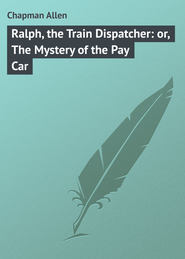По всем вопросам обращайтесь на: info@litportal.ru
(©) 2003-2024.
✖
Ralph of the Roundhouse: or, Bound to Become a Railroad Man
Настройки чтения
Размер шрифта
Высота строк
Поля
Ralph was becoming intensely interested.
"He robbed my father, you say?"
"Yes."
"Are you sure of that, Mr. Gibson?"
"I am positive of it. I have the proofs. Even without those proofs, my unsupported word would substantiate the charge. The more so, because I helped him do it."
CHAPTER XXXI-A REMARKABLE CONFESSION
"You helped Gasper Farrington rob my father!" exclaimed Ralph.
"Yes," answered Gibson unhesitatingly.
Ralph wondered how he could make the admission thus boldly and unblushingly. Gibson, however, acted like a man who had taken a desperate stand with an important end to attain, and for the time being at least had set aside all questions of sentiment and conscience.
"It will be brief," said Gibson, after a pause. "When the Great Northern was on its first boom and everybody gone wild to invest in its bonds, I caught the fever too. My wife had died and I had no children, and converting my land into cash I came up to Stanley Junction with thirty thousand dollars in my pocket. I was always stuck on railroading. I fancied myself a director, riding in the president's car and distributing free passes to my friends. In a black moment in my life I ran afoul of Gasper Farrington. He took me under his wing and encouraged my visionary ideas. At that time your father had twenty thousand dollars in Great Northern bonds. They were not all paid for, but nearly so. They were, in fact, held by a bank as trustee in what is known as escrow-that is, subject to his call on payment of the small sum still due on them. Your father had great confidence in Farrington. So had I. I put my capital in his hands."
Gibson became so wrought up in his recital that he could not sit still. He got up and paced the floor.
"If we had kept to a straight investment, your father and I," proceeded Gibson, "we would have been all right. But Farrington dazzled us with his stock-jobbing schemes. He actually did let us into a deal where by dabbling in what is called margins we increased our pile considerably. In about a month, however, he had us where he wanted us. That is, he had our affairs so mixed up and complicated that neither of us knew just where we stood, and didn't dare to make a move without his advice. For some time we had all been dabbling in Midland Central securities. One day, after he had got me to buy a big block of that stock, the market broke. I was a pauper."
"Had Mr. Farrington lost too?" inquired Ralph.
"He pretended that he had, but later I found that he was the very person who was manipulating the stocks on the sly, and trimming us. We had a bitter quarrel. Then he said all was fair in war and business. I was desperate, lad, about my money, and when he set up a plan to get hold of your father's bonds, I went into it. I am sorry now. I was crazy those days, I guess, money-mad!"
The man's candor vouched for his sincerity, but Ralph looked sad and disturbed.
"Anyway, he got your father in a tight corner, and I helped him do it. It was a complicated deal. I can't say that Farrington stole those bonds outright, but in a roundabout way they finally came into his possession. If the transaction was ever ripped up, I don't believe it would stand in law. But I don't know that positively. Your father lost his bonds, and I got nothing out of the transaction. But there is something else that I want to get at. A little later, never doubting Farrington's honesty, your father gave him a mortgage on his homestead. It was done to protect your mother-that is, feeling himself getting involved, your father wished to be sure that she had at least a shelter over her head. There was no consideration whatever in the deal. It was merely put temporarily in the shape of a mortgage until affairs had cleared somewhat, when it was to be deeded to a third party, and then direct to your mother."
"Then Mr. Farrington never had a right to collect that interest money," said Ralph.
"He wasn't entitled to a cent of it. Farrington then got me into another deal. I had borrowed one thousand dollars from my brother. He got me to take security for it, as he called it. In some way he had got hold of the old Short Line charter here. At that time it was treated as a joke, and considered worthless. I didn't know it. He got my thousand dollars, claimed to lose it in a deal, and I was flat broke."
"And later?" suggested Ralph, recalling in an instant what he had heard from Big Denny about Gibson.
"Well, I got hard pressed. I saw a chance to get even with him. We were in a deal together. I canceled it to get a few hundred dollars, and signed our joint names as a firm. Later I learned that I had a right only to sign my own name. I went to his house. He threatened to have me arrested for forgery the next day, showed me the forged paper, as he called it, and a warrant he had sworn out. We had a fearful row. I beat him up good and proper, smashed some windows, and, disgusted with life and mankind, fled to this wilderness."
It was a vivid recital, running like some romance. Gibson took breath, and concluded:
"A man can't sit forever eating out his heart in loneliness. I knew that Farrington would not hesitate to send me to jail. I located here. One day, yonder faithful fellow, Van Sherwin, came along. He was an orphan outcast, I took him in. His company gave a new spur to existence. I got casting up accounts. I rarely ventured to the towns, but I sent him to a relative, who loaned me a few hundred dollars. I investigated the Short Line business, even paid a lawyer to look it up. I found I had something tangible, and that for a certain date, then two months ahead, provided I did some work each day except Sunday thenceforward on the right of way, I could hold the franchise indefinitely, unimpaired. Since then, Van and I have been at the grading work, as you see."
"And why did you write to my father? inquired Ralph.
"My hard, bad nature has changed since Van came here to cheer me with his loyal companionship," said Gibson. "I always felt I had wronged your father. I wrote to him, thinking him still alive, to come and see me. Instead, you come as his representative. Very well, this is what I want to say: I am willing to make the statements in writing that I have given to you verbally. That, you may say, is of no practical benefit to you. But here is something that is: My sworn statement that the mortgage was in reality a trust will cancel everything. That means something for you, doesn't it?"
"It means a great deal-yes, indeed," assented Ralph.
"Very well," said Gibson. "You go and use the information I have given you, the threat to expose Farrington, to get him to destroy that forged note he holds against me, so that I can come out into the daylight a free man to put my railroad project on foot, and I will give to you a sworn statement that in any court of law will compel him to surrender to your mother, free and clear, your home. And I won't say right now what I will be glad to do for the widow and son of John Fairbanks, when the Short Line is an assured fact and a success."
CHAPTER XXXII-FOUND
It did not take Ralph long to figure out the merits and prospects of the proposition that Farwell Gibson had made to him.
As the latter went more into details concerning his own and Mr. Fairbanks' dealings with Gasper Farrington, Ralph felt a certain pity for the hermit. He had been the weak, half-crazed tool of a wicked, cool headed plotter, had repented his share of the evil doings, and was bent on making what restitution he might.
The peculiar situation of affairs, Ralph's quick-witted comprehension of things, above all his kindness to Van Sherwin, had completely won Gibson's confidence.
They had many little talks together after that. They compared notes, suggested mutually plans for carrying out their campaign against the Stanley Junction magnate, legally and above board, but guarding their own interests warily, for they knew they had a wily, unscrupulous foe with whom to contend.
Gibson insisted that they could do nothing but rest that day and the next, and when the third day drifted along he took Ralph for an inspection of his enterprise.
There was not the least doubt but that Gibson had a valuable proposition and that he had legally maintained his rights in the premises.
"Every day except Sunday within the prescribed period of the charter, I have done work on the road as required by law," he announced to Ralph. "Van's affidavit will sustain me in that. Everything is in shape to present the scheme to those likely to become interested. It will be no crooked stock deal this time, though," he declared, with vehemence. "It's a dead-open-and-shut arrangement, with me as sole owner-it's a lump sum of money, or the permanent control of the road."
Van's eyes sparkled at this, and Ralph looked as if he would consider it a pretty fine thing to come in with the new line under friendly advantages, and work up, as he certainly could work up with Gibson so completely disposed to do all he could to forward his interests.
Next morning Ralph said he had other business to attend to. It was to go to Dover in pursuance with his instructions from Matthewson, the road detective of the Great Northern.
It was arranged that Van should drive him over in the gig. If Ralph made any important discoveries that required active attention, he was to remain on the scene. If not, he promised to return to "headquarters" on his way back to Stanley Junction.
Ralph reached Dover about noon, and put in four hours' time. He located Jacobs, the man to whom the stolen fittings were to have gone, he saw the local police, and he gathered up quite a few facts of possible interest to Matthewson, but none indicating the present whereabouts of Ike Slump, his tramp friend, or the load of plunder.
"Did you find out much?" Van inquired, as they started homewards about five o'clock.
"Nothing to waste time over here," replied Ralph. "I imagine the Great Northern has seen the last of its two thousand dollars' worth of brass fittings, and Stanley Junction of Ike Slump, for a time at least."
The Gibson habitation was more accessible from this end of The Barrens than from the point at which Ralph and Van had four days previously entered it.
There was a road for some ten miles, and then one along a winding creek for half that distance. Beyond that lay the jungle.
The sun was just going down when they forded the creek. The spot was indescribably wild and lonely. Its picturesque beauty, too, interested the boys, and they were not averse to a halt in mid-stream, the horse luxuriating in a partial bath and enjoying a cool, refreshing drink.
Suddenly Ralph, who had been taking in all the lovely view about them, put a quick hand on Van's arm.
"Right away!" he said, with strange incision-"get ashore and in the shelter of the brush."
"Eh! what's wrong?" interrogated Van, but obediently urged up the horse, got to the opposite bank, and halted where the shrubbery interposed a dense screen.
"Now-what?" he demanded.
Ralph made a silencing gesture with his hand. He dropped from his seat, went back to the edge of the greenery, and peered keenly down stream.
He seemed to be watching somebody or something, and was so long at it that Van got impatient, and leaping from the wagon approached his side.
"What's up?" he asked.











